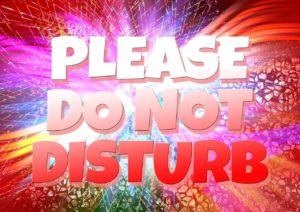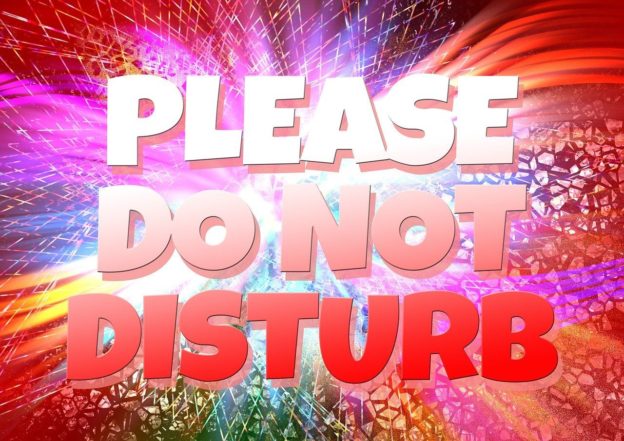Getting distracted is something we all do – new things excite us, boredom bores us and pushes us to look for something to distract us from whatever it is we’re doing.
If you’ve just started working from home, distraction is rife.
You haven’t got the discipline that comes from turning up to work at a certain time, sitting behind your desk and the chance of other people figuring out that you’re not paying as much attention as you should.
 But when there’s less chance of being caught and there’s always the excuse of “I’ll catch up later” then distractions loom large.
But when there’s less chance of being caught and there’s always the excuse of “I’ll catch up later” then distractions loom large.
The same opportunity for distraction happens with our goals. At the start, we’re ultra keen and tell ourselves we’re definitely going to go right the way through to completion this time. Then life gets in the way and that nice, shiny, goal begins to take second place and gradually gets put on the pile of goals that never quite made it.
Most of us have a few things that we allow to distract us almost at will:
- Facebook – has someone we know posted something new or replied to a conversation
- Emails – is there something important we need to reply to?
- YouTube – “just” one more video to watch
The list goes on.
Electronic distractions are awkward when you’re working from home as there’s a high chance you’ll be at your computer. It’s easier on a phone as there are apps that will help you keep to time limits but when you can just open another tab or a different browser, it’s harder to keep on top of.
Learn to focus more
Focus isn’t something we’re really taught at school. Sure, we’re told to pay attention in lessons but that’s about as far as it goes. Everything else is up to us.
Humans work best with relatively short periods of intense focus, followed by time to chill.
The Pomodoro technique does this by having you focus on the task for 25 minutes, then taking a 5 minute break. Then repeat. Then take a longer break before repeating the cycle again. This works nicely and means there’s always a short break fairly soon, which helps keep our minds on track during the work.
Focus on small, achievable parts
If you try to focus on the big picture, chances are you’ll feel overwhelmed.
Sure, you need a big picture to aim for but, much like a jigsaw, it needs to be broken up into smaller pieces. Ideally, each individual piece shouldn’t take too long to complete – maybe an hour or two, maybe a day, at a push maybe two days but for most people that’s too big a stretch and it should be split into smaller parts.
It’s a lot easier for most of us to keep with a relatively small part of something for a relatively short space of time than it is to spend days or weeks on the same task with no sign of it ending/
Beware internal distractions
These can be anything that takes you away from the task at hand. Anything from your stomach rumbling to your mind wandering off in as many different directions as it can manage, none of which having anything to do with the task at hand.
Internal distractions are a big part of most people’s life.
Learning to chill more – and not be as dependent on caffeine – can help. That could mean taking a short walk to clear your head or doing meditation or even just standing up rather than being sat at your desk.
Take the time to work on minimizing your internal distractions. They’re unlikely to completely go away but you can almost certainly reduce their impact on you.
Get rid of the clutter
Clutter happens everywhere, especially when we tell ourselves we’re too busy to have a tidy-up.
The problem is, the more clutter you have around you, the more difficult it is to find what you’re looking for and the more your mind thinks it’s OK to be disorganized.
Spend a few minutes tidying the things around you – it doesn’t have to be the whole area today, you could spread it over a few days, but it needs to happen.
You’ll sense a feeling of relief when you have done it and it’s a lot easier to keep a tidy area tidy so it’s worth the effort. Honest.
Accept that there will be interruptions
People contacting you by phone or Skype or WhatsApp don’t know your schedule.
My phone is set to send any private or withheld number direct to voicemail so I get less interruptions from telemarketers or – here in the UK – people pretending to carry out a survey (that way they get over a lot of our rules on cold calling).
Anyone else who calls, it depends. If it’s a landline, I’ll let it go to voicemail. If it’s a cell phone, I’ll probably answer but I’m quick to cut the call off if it’s just another junk call.
But that still means it’s an interruption so if I’m really trying to concentrate, the phone and any apps that are likely to interrupt are set to silent. Voicemail rules out about half the calls as they don’t bother leaving a message, so it can’t have been urgent.
Try silencing your phone – it’s a fairly easy way to cut down on the distractions.
Train your mind
As I said eariler, school doesn’t teach us to focus. Nor does work. They just assume we know what to do (bad assumption for most of us).
Training your mind is the best way to go and hypnosis is, in my view, one of the best options.
It helps you relax as part of the process, so that ticks one of the options above.
And it works with your subconscious to help you reduce the number of distractions that distract you.
Check out this reduce distractions MP3 that you can download and start using immediately.








